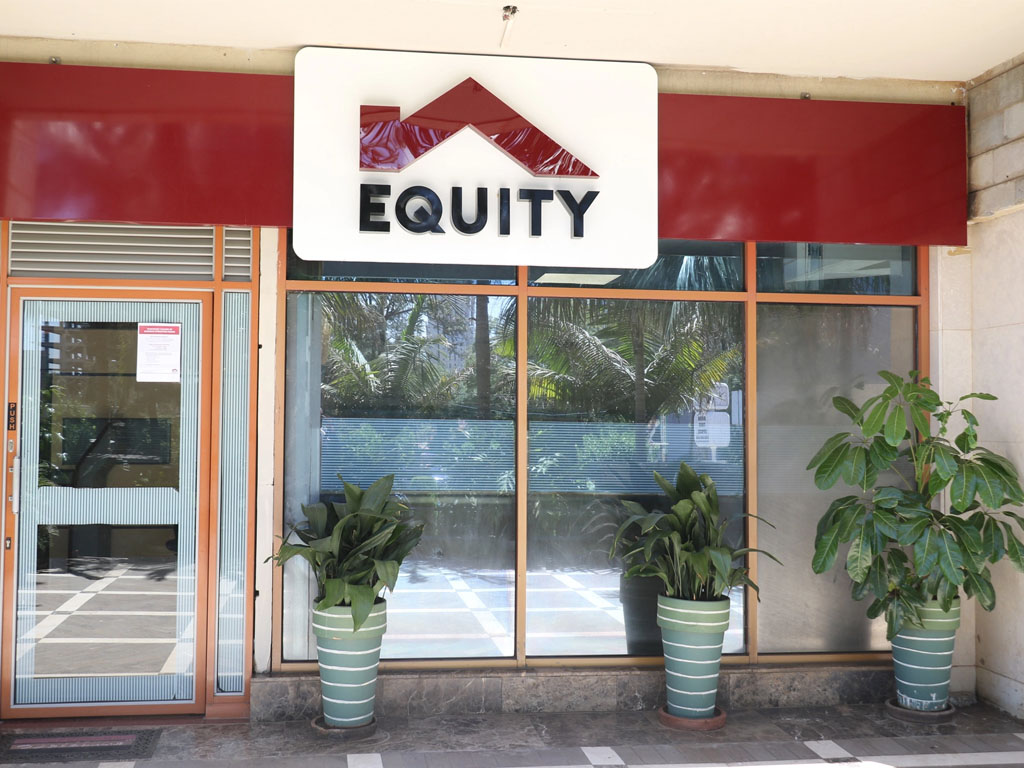News
Equity Heist Exposed in Sh83 Million Loan Battle with Fired Auditor

In a dramatic legal twist, Equity Bank Kenya Limited has been barred from hiking interest rates on loans issued to its former head of internal audit, Bildad Khaemba Fwamba.
The former auditor, who was sacked in October 2024 over a reported Sh1.5 billion fraud at the bank’s salary processing unit, is now fighting back.
The High Court has granted him temporary relief, stopping the lender from adjusting his loan terms amid an unresolved employment dispute.
The court said Equity’s move would cause Khaemba irreversible damage while the bank holds enough collateral to stay secure.

If the court eventually rules that Mr. Khaemba’s firing was unjust, it could open up a wave of scrutiny into the bank’s internal investigation processes and how it treats long-serving employees under suspicion. [Photo: Courtesy]
Court Blocks Equity from Hiking Loan Rates in Sh83 Million Case
High Court judge Agnes Kitiku ruled in favor of Mr. Khaemba, stopping Equity Bank from adjusting his mortgage and equity release loan rates—initially offered at staff-friendly terms.
Khaemba, who served the lender for over two decades, had taken out loans worth Sh83 million between 2010 and 2023 while enjoying staff rebate rates of 6% and 8% respectively.
But just weeks after his October 9 dismissal, the bank sent him a letter dated November 27 stating his interest rates would rise sharply—his mortgage would go from 6% to commercial rates, while the staff equity release loan would jump to 13%.
The court stepped in, warning that the drastic hike would harm Khaemba, especially since his properties had been offered as collateral.
“The claimant continues to repay the loans at the agreed staff rates, and the bank has not shown he defaulted,” ruled Justice Kitiku. She added that Equity Bank still holds title deeds to the charged properties, shielding it from any real loss if the dispute drags on.
The judge noted that Khaemba had “satisfactorily demonstrated” the risk of suffering “irreparable loss” if the bank was allowed to change the loan terms before a final verdict on his case.
Auditor Sacked Amid Sh1.5 Billion Payroll Fraud Probe
The legal standoff stems from Khaemba’s abrupt sacking in October 2024 over an alleged payroll fraud involving Sh1.5 billion. According to the bank, suspicious RTGS (Real Time Gross Settlement) transactions had been detected on its salary processing platform, prompting an internal probe.
The dismissal letter accused him of “several omissions or commissions, failure or negligence” in his role within the audit function. But Khaemba insists the accusations were vague, general, and not backed by specific claims of wrongdoing.
He argues that during the period in question, he was on secondment to Equity Group Holdings Ltd and was only briefly attached to the Kenyan unit—from February 15 to April 15, 2024. During this time, he says his focus was on preparing for a board audit committee meeting held on March 5 and other strategy assignments.
Khaemba claims he was not directly overseeing the payroll operations under investigation, a detail he believes undermines the bank’s reasons for termination.
He joined Equity in 2001, when it was still trading as Equity Building Society, and rose through the ranks to become the group’s chief internal auditor. His long service record, multiple transfers, and secondments across the group add weight to his claim that the dismissal was uncalled for.
Bank Claims Valid Dismissal and Denies Loan Rights
Equity Bank is defending its decision, arguing that the dismissal followed the law and that due process was followed. The lender insists that Khaemba’s reassignment to the Kenyan unit as Director of Internal Audit gave him direct responsibility over system controls, including the salary processing platform now under scrutiny.
The bank adds that only current employees are entitled to rebated interest rates on loans. Since Khaemba was terminated, they say, he no longer qualifies for staff benefits. Allowing him to continue enjoying the lower rates, Equity argues, would be equivalent to giving him back employment perks without a job.
In court documents, the bank said there was no proof that Khaemba was unable to pay the new rates, adding that he had been meeting his loan obligations without difficulty. However, the court found that financial hardship is not the only factor and that unfair treatment and possible reputational damage also count.
More Questions Than Answers
The Equity heist saga is far from over. While the court has blocked the bank from enforcing new loan rates—for now—the question of whether Mr. Khaemba was fairly dismissed remains central.
If the court eventually rules that his firing was unjust, it could open up a wave of scrutiny into the bank’s internal investigation processes and how it treats long-serving employees under suspicion.
On the flip side, if Equity proves that its case was valid, it could justify clawing back benefits from any employee linked to fraud or oversight failures.
But for now, the High Court has sent a clear message—banks must not weaponize financial tools to punish former employees whose cases are still pending.
The ruling preserves the principle of due process and serves as a warning to corporate giants that contract terms—even on loans—cannot be altered at will.
Kenya Insights allows guest blogging, if you want to be published on Kenya’s most authoritative and accurate blog, have an expose, news TIPS, story angles, human interest stories, drop us an email on [email protected] or via Telegram
-

 Business2 weeks ago
Business2 weeks agoEastleigh Businessman Accused of Sh296 Million Theft, Money Laundering Scandal
-

 Investigations1 week ago
Investigations1 week agoInside Nairobi Firm Used To Launder Millions From Minnesota Sh39 Billion Fraud
-

 Business1 week ago
Business1 week agoMost Safaricom Customers Feel They’re Being Conned By Their Billing System
-

 News1 week ago
News1 week agoUnfit for Office: The Damning Case Against NCA Boss Maurice Akech as Bodies Pile Up
-

 Business2 weeks ago
Business2 weeks agoEXPLOSIVE: BBS Mall Owner Wants Gachagua Reprimanded After Linking Him To Money Laundering, Minnesota Fraud
-

 News1 week ago
News1 week agoTax Payers Could Lose Millions in KWS Sh710 Insurance Tender Scam As Rot in The Agency Gets Exposed Further
-

 News1 week ago
News1 week agoPastor James Irungu Collapses After 79 Hours Into 80-Hour Tree-Hugging Challenge, Rushed to Hospital
-

 News1 week ago
News1 week agoDeath Traps: Nairobi Sitting on a Time Bomb as 85 Per Cent of Buildings Risk Collapse





























